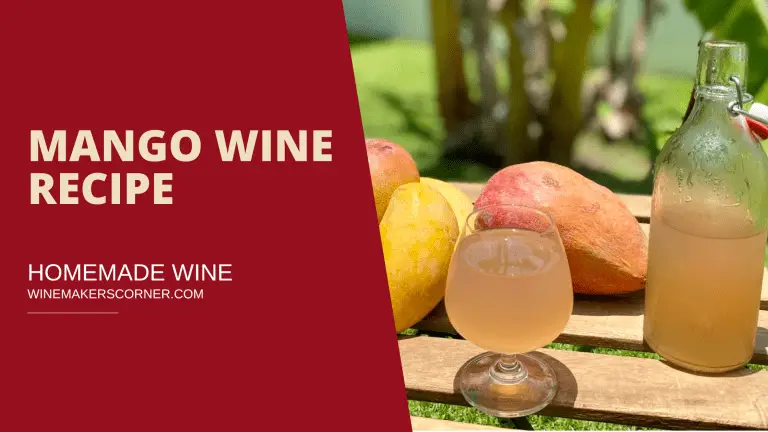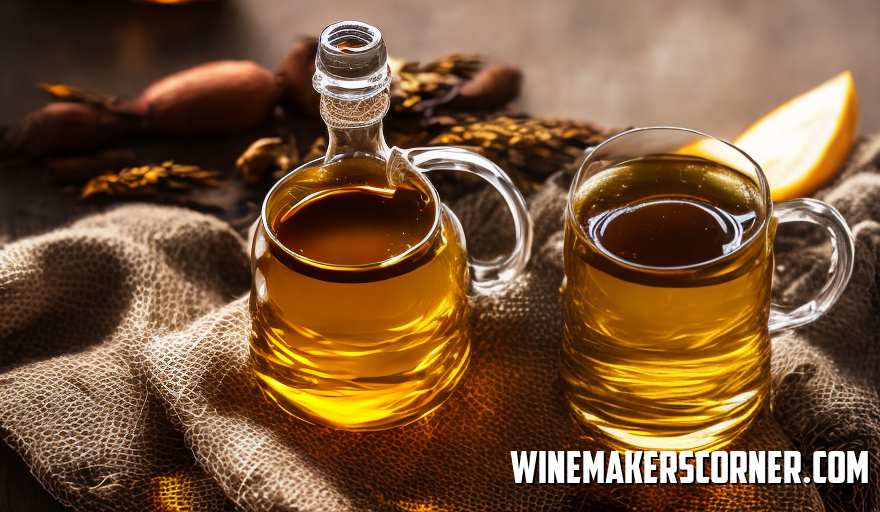Fruit wines offer a delightful alternative to traditional grape wines, with mango wine standing out as a tropical and refreshing option. Preparing homemade mango wine is a rewarding process that captures the exotic flavors of mango, complementing a variety of occasions and cuisines.
Unlike store-bought wines, creating your own batch allows for customization and a deeper appreciation for the winemaking craft. One can achieve a sweet, aromatic, and distinctly flavored mango wine with the right balance of ingredients and patience during the fermentation process.

Homemade mango wine requires few ingredients and relatively simple equipment, but attention to detail is key in ensuring a successful outcome. This delicate process begins with fresh, ripe mangoes, which are prepared and mixed with sugar to create the wine’s base.
Utilizing yeast to drive fermentation, the transformation from fruit to wine unfolds over the course of several weeks. Each step, from preparation to bottling, involves care and precision to produce a wine embodying mango’s essence.
Key Takeaways
- Homemade mango wine is a tropical alternative to traditional grape wines, offering a unique flavor.
- A meticulous process and patience are crucial for a successful mango wine, which can be customized.
- The journey from fruit to wine unfolds over several weeks, requiring careful attention to detail.
Table of Contents
Understanding the Basics of Mango Wine

Mango wine, often celebrated for its sweet and fruity profile, is an alcoholic beverage made by fermenting the juice of mangoes. This section explicates what mango wine is and why mangoes are beneficial in the winemaking process.
What Is Mango Wine?
Mango wine is a type of fruit wine that harnesses both the natural sugars and flavors of mangoes to create a beverage that can range from sweet to dry. The fermentation process is catalyzed by yeast, which converts the sugars present in the fruit into alcohol and carbon dioxide. The making of mango wine follows a method similar to that of grape wine, with specific attention to the fruit’s characteristics.
- Ingredients often include:
- Fresh mangoes
- Sugar
- Water
- Yeast
- Nutrients for the yeast, such as Campden tablets
- Typical preparation involves:
- Peeling and mashing the mangoes
- Dissolving sugar in water
- Combining the ingredients and adding yeast for fermentation
Benefits of Mango in Winemaking
Mangoes are an excellent fruit for winemaking due to their high content of vitamins, minerals, and antioxidants. These nutritional components contribute not only to the final product’s healthfulness but also to its flavor profile’s complexity and richness. Mango wines can capture the essence of mangoes, offering a taste that is often described as a balance of sweetness with a hint of tart acidity.
- Fruits like mangoes contribute:
- Natural sugars for fermentation
- Unique flavors result in a distinct wine variety
- Nutritional benefits, including antioxidants that may have health-promoting properties
Mango wine demonstrates how traditional winemaking can adapt and innovate, creating diverse and intriguing flavors from a beloved tropical fruit.
Essential Ingredients and Equipment

Preparing mango wine requires specific ingredients and equipment to ensure a successful fermentation and delightful taste. This section breaks down the essential components you’ll need for homemade mango wine.
Key Mango Wine Ingredients
For a traditional mango wine, you’ll need a combination of fresh produce and specific additives that aid in the fermentation process.
- Mangoes: You’ll need 2 lbs of fresh, ripe mangoes. Clean, peel, and mash them to release their flavors and juices.
- Sugar: Sugar is crucial for fermentation, with 3 lbs needed to convert into alcohol and give the wine its sweetness.
- Water: Use 3 quarts of clean, preferably filtered water to dilute the sugar and balance the wine’s flavor.
- Yeast Nutrient: A yeast nutrient ensures healthy yeast propagation and stable fermentation.
- Wine Yeast: One package of wine yeast is used to ferment the sugars in the mixture into alcohol.
- Campden Tablet: A Campden tablet helps to sterilize the must (unfermented wine) and prevent oxidation.
Equipment List for Winemaking
Proper equipment is vital for a smooth winemaking process, ensuring cleanliness and efficiency.
- Fermentation Bucket: A sanitized plastic or glass bucket is needed to combine and ferment the initial mixture.
- Demijohn or Carboy: Transferred after initial fermentation, a demijohn or carboy allows the wine to ferment without the risk of contamination.
- Airlock: This device will let gases escape without letting air into the wine, preventing oxidation during secondary fermentation.
- Potato Masher: Essential for mashing the mangoes to create a smooth mash.
- Funnel: A funnel is handy for transferring liquids without spilling.
- Wine Bottles: To store the finished wine, have clean, sanitized wine bottles at the ready.
- Corks: Corks are used to seal the bottles, ensuring that the wine can mature without being exposed to air.
- Siphon Tubing: This allows for the transfer of wine from the bucket to the carboy and later into the bottles.
Preparation Before Fermentation

Before starting the fermentation process for mango wine, it is critical to properly select and prepare the mangoes and to create the right environment for the yeast, which involves preparing the must (the mixture of ingredients before fermentation). These two steps are fundamental to set the stage for a successful fermentation process.
Selecting and Preparing the Mangoes
First, source 2 lbs of fresh mangoes for their rich flavor and natural sugars. Choose ripe mangoes; they should give slightly under pressure and exude a sweet aroma. Once selected, cleanliness is paramount:
- Wash the mangoes thoroughly to remove any contaminants that might interfere with the fermentation.
- Peel the mangoes to get rid of the skin, which can introduce unwanted bitter flavors.
- Finally, mash the peeled mangoes using a potato masher, thereby turning it into a soft mango puree. This step will help in releasing the juices and flavors which are essential for the wine.
Creating the Must
Creating the must is an essential step that involves combining the prepared mango puree with water and sugar to form the base where fermentation will happen:
- Dissolve 3 lbs of sugar into 3 quarts of water to create a sugar syrup. Make sure to use a clean utensil to avoid contamination.
- Pour this sugar syrup into a sanitized bucket and then add the mango puree.
- Introduce one Campden tablet to the mix; this will help sterilize the must without boiling, paving the way for the safe introduction of yeast.
- Cover the mixture and let it rest for 24 hours at room temperature. This step is crucial as it allows the Campden tablet to halt any wild yeast and bacteria growth.
- After a day, add the wine yeast to the preparation. Stir thoroughly to ensure that yeast is evenly distributed through the must.
This preparation stage sets the foundation for a successful fermentation phase, where the yeast will gradually convert the sugars from the mangoes and the added syrup into alcohol.
The Fermentation Process

The fermentation process is crucial in transforming the sugars present in mangoes into alcohol and it takes place in two main stages: primary and secondary fermentation. Ensuring proper sanitation and monitoring of various parameters such as specific gravity can influence the quality of the resulting mango wine.
Primary Fermentation
In this initial phase, yeast is added to the concoction of mashed mangoes, sugar, and water where it begins to consume the sugars, producing alcohol and carbon dioxide. Lalvin EC1118, a robust wine yeast, can be used due to its high alcohol tolerance and wide temperature range. The fermentation bucket should be secured with a lid or cloth to prevent contamination, and a Campden tablet is utilized to inhibit unwanted bacteria.
- Time frame: 7-10 days
- Temperature: room temperature is usually sufficient
After 24 hours, add a sanitized airlock. This allows carbon dioxide to escape while preventing outside air and contaminants from entering.
Secondary Fermentation
Once the vigorous primary fermentation slows down, the wine is strained into a clean, sanitized carboy for secondary fermentation. The transfer removes the wine from the sediment that has formed, known as ‘lees’. A hydrometer can be used to measure the specific gravity to monitor the fermentation process and estimate the alcohol content.
- Gravity readings should be taken periodically.
- Airlock should be in place to continue the protection against contaminants.
Lallemand Fermaid can be added as a nutrient for the yeast to ensure a healthy fermentation environment. The secondary fermentation allows the wine to clarify and mature.
Monitoring the Fermentation
Monitoring is vital during the fermentation process. Specific gravity will gradually decrease as sugar converts to alcohol, measured with a hydrometer. Fermentation temperature plays a critical role; Lalvin EC1118 yeast works well within the range of 15-25°C (59-77°F). A steady temperature ensures consistent fermentation.
- Check the specific gravity regularly: before, during, and after fermentation.
- Observe the activity through the airlock: bubble formation signals active fermentation.
Once the bubbling in the airlock ceases and specific gravity readings are stable over a few days, the fermentation process is considered complete. After secondary fermentation, the wine can be racked off again if necessary, to help it clear before bottling.
Post-Fermentation Steps

After the mango wine has completed the primary fermentation phase, involving around three weeks in a sanitized carboy, there are crucial steps to ensure the wine’s clarity, taste, and quality. These include the racking process, testing and adjusting sweetness, and finally, maturation and aging for optimal flavor development.
The Racking Process
The purpose of racking is to clarify the wine by removing sediment and yeast that have settled at the bottom of the fermentation vessel. This process improves the taste and quality of the final product. Here is how to perform the racking:
- Sanitize a racking cane and a secondary fermentation vessel.
- Carefully siphon the wine, avoiding disturbance to the sediment layer.
- Transfer the wine from the primary to the secondary vessel.
- Ensure an airtight seal on the secondary vessel and store it for continued aging.
Testing and Adjusting Sweetness
After the initial racking, the mango wine’s sweetness level should be tested and adjusted according to preference. This evaluates if additional sugar is needed to balance the flavors. To sweeten the wine:
- Sanitize testing equipment like a hydrometer or a sugar trial jar.
- Take a sample of the wine to measure the sweetness.
- If needed, dissolve sugar in water and gradually add to the wine.
- Stir gently to integrate the added sugar without aerating the wine.
Maturation and Aging
Maturation and aging are the final steps, critical to developing the wine’s full flavor profile. During this period, the wine stabilizes, and its components integrate harmoniously. Here’s what to consider:
- Age the wine in a cool, dark place with a consistent temperature.
- Monitor the wine periodically, checking clarity and taste.
- Allow sufficient time for aging, which could be several months to a year, to achieve the desired complexity.
During post-fermentation, patience and attention to detail are vital for crafting a mango wine that showcases the fruit’s natural flavors while maintaining a harmonious balance.
Bottling Your Mango Wine

After carefully following your mango wine recipe and allowing the fermentation process sufficient time, the next critical phase is bottling. Proper bottling helps to preserve the wine’s quality and taste.
Preparing the Bottles
Before filling, all bottles must be thoroughly sanitized to prevent contamination. Use a solution of one part unscented bleach to ten parts water or a specialized no-rinse sanitizer commonly available at homebrew shops. Once clean, rinse (if using bleach) and let the bottles air-dry completely.
- Inspect each bottle for chips or cracks.
- Sanitize using a bottle brush and the chosen sanitization solution.
- Rinse (if required) and dry upside down on a bottle tree or clean rack.
Filling and Sealing
Filling should be done carefully to avoid oxidation and include just the right amount of headspace, approximately half an inch from the top.
- Use a siphon or a bottling wand attached to the fermentation vessel to transfer wine into bottles, reducing contact with air.
- Stop filling half an inch from the bottle’s brim to ensure proper headspace for sealing.
Sealing bottles is the final step to ensure the wine is preserved and can age without the risk of oxidation or spoilage.
- Select the appropriate corks and a corker for sealing.
- Corks should also be sanitized ahead of time.
Carefully insert corks using a hand corker or floor corker to seal the wine bottles tightly. Once sealed, the bottles should be stored upright for a few days to allow the corks to expand and form a tight seal, after which they can be placed on their sides for long-term aging.
Serving and Enjoying

When it comes to serving and enjoying homemade mango wine, attention to detail can enhance the tasting experience. Proper decanting, presentation, and understanding the tasting notes are key elements for optimal enjoyment.
Decanting and Presentation
Before serving, it may be beneficial to decant the mango wine, especially if it’s been aged for a considerable amount of time. Decanting allows the wine to breathe and can soften any remaining harsh flavors. Serve mango wine in a wine glass to appreciate its full aroma profile. For presentation, consider the serving temperature, which should be slightly chilled between 50-55°F (10-13°C) to highlight its freshness and fruitiness.
Tasting Notes
Tasting homemade mango wine involves evaluating its taste and flavor. The tropical essence of mango should be at the forefront, with a balance between sweetness and acidity. Look for subtle complexities and additional fruit notes that have developed during fermentation. The homemade recipe ensures a unique and fresh flavor profile that may differ slightly with each batch. The wine should be sipped slowly to appreciate all nuances of its character.
Variations and Creative Twists

When crafting homemade mango wine, enthusiasts have the opportunity to personalize their brew with inventive variations and creative twists.
Experimenting with Flavor Additives
- Fruit Variants: Incorporating kesar mangoes, known for their intense sweetness and vibrant color, can intensify the tropical flavor profile.
- Spices: A pinch of cardamom or a hint of vanilla can add a unique twist, complementing the mango’s natural flavors.
Additional Ingredients for Flavor Additives:
- Kesar mangoes (as desired for enhanced flavor)
- Spices like cardamom or vanilla (1/4 teaspoon per gallon)
Creating Sparkling Mango Wine
Transforming Still Wine to Sparkling:
- Method: Carbonation can be introduced to the mango wine through the traditional bottle fermentation method, adding a certain effervescence that elevates the sensory experience.
- Mango Mead Alternative: Consider substituting honey for sugar to introduce complexity, creating a delightful mango mead that can later be carbonated for a sparkling twist.
Table for Sparkling Additions:
| Ingredient | Quantity | Purpose |
|---|---|---|
| Honey (optional) | 2-3 lbs | To create mango mead |
| Carbonation Drops | As recommended | For bottle carbonation |
Creating homemade mango wine can be an extremely rewarding endeavor, wherein experimenting with additional flavors and converting a traditionally still wine into a sparkling variant offers an array of delightful taste experiences.
Frequently Asked Questions

In this section, you will find detailed answers to some of the most common questions regarding homemade mango wine, covering everything from ingredients to flavor and alcohol content.
What are the essential ingredients needed to make homemade mango wine?
The basic ingredients required for making homemade mango wine include fresh mangoes, sugar, water, a Campden tablet to sterilize the must, and wine yeast for fermentation.
Can you explain the step-by-step process of making mango wine at home?
To make mango wine at home, begin by cleaning and peeling the mangoes. Mash the fruit, then combine it with sugar dissolved in water in a sanitized container. After adding the Campden tablet, let the mixture rest for 24 hours before introducing wine yeast. Allow initial fermentation for 7-10 days, then transfer the liquid to a carboy for continued fermentation.
How can mango wine be made without using yeast, and what is the alternative?
Mango wine typically requires yeast for fermentation. Without yeast, natural fermentation could occur if wild yeasts are present, but the results can be unpredictable. An alternative is to use a yeast nutrient if the environment does not have enough natural yeasts.
What is the typical fermentation time for mango wine?
The initial fermentation of mango wine usually takes about 7-10 days in a bucket, followed by a secondary fermentation in a carboy lasting approximately three weeks, depending on the specific yeast strain and environmental conditions.
How does the incorporation of ingredients like pineapple or strawberry alter the flavor profile of mango wine?
Adding fruits such as pineapple or strawberry to mango wine can introduce complementary flavors, enhance complexity, and add varying degrees of acidity or sweetness, resulting in a more nuanced and layered flavor profile.
Is the alcohol content in homemade mango wine comparable to that of other wines, and what factors can influence it?
The alcohol content in homemade mango wine can be comparable to other wines, typically ranging between 11-14%. Factors influencing alcohol content include the initial sugar content, the yeast strain’s tolerance to alcohol, and fermentation time and temperature.




